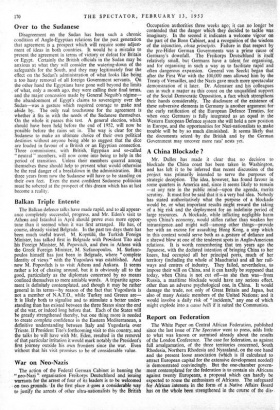Over to the Sudanese
Disagreement on the Sudan has been such a chronic condition of Anglo-Egyptian relations for the past generation that agreement is a prospect which will require some adjust- ment of ideas in both countries. It would be a mistake to present the agreement in terms of victory or defeat for Britain or Egypt. Certainly the British officials in the Sudan may be anxious at what they will consider the watering-down of the safeguards for the South, and they may legitimately fear the effect on the Sudan's administration of what looks like being a too hasty removal of all foreign Government servants. On the other hand the Egyptians have gone well beyond the limits of what, only a month ago, they were calling their final terms, and the major concession made by General Neguib's regime--- the abandonment of Egypt's claims to sovereignty over the Sudan—was a gesture which required courage to make and abide by. The only real touchstone for the agreement is whether it fits in with the needs of the Sudanese themselves. On the whole it passes this test. A general election, which should have been held before the end of 1952, will now be possible before the rains set in. The way is clear for the Sudanese to make an ultimate choice of their own political destinies without anyone being able to suggest that the dice are loaded in favour of a British or an Egyptian connection. Three commissions, with British, - Egyptian and so-called " neutral " members, will now come into being to help in the period of transition. Unless their members quarrel among themselves these should help to prevent what would otherwise be the real danger of a breakdown in the administration. But three years from now the Sudanese will have to be standing on their own feet. Even the most confident Sudanese politician must be sobered at the prospect of this dream which has at last become a reality.


































 Previous page
Previous page